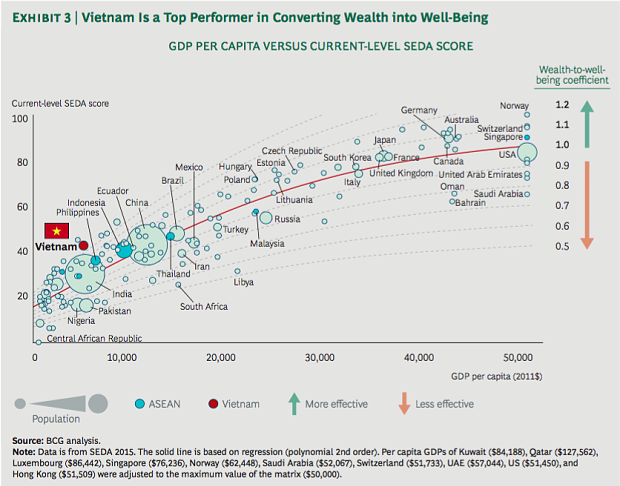Edition: International | Vietnamese
© Copyright 1997 VnExpress.net. All rights reserved.

Yesterday, Boston Consulting Group (BCG) announced the results of two reports, “Sustainable Economic Development Assessment” (SEDA), which assessed 149 countries, and “Lotus Nation: Sustaining Vietnam’s Impressive Gains in Well-Being”, at a press conference in Hanoi.
The reports find that Vietnam, with GDP per capita of $5,200 has well-being levels that would be expected of a country with GDP per capita of more than $10,000. Vietnam also scores above average in converting economic growth into well-being improvements.
BCG Vietnam Managing Director Chris Malone, said that Vietnam is on par with countries like Japan, Germany and Australia in its ability to convert wealth into well-being.
“This is particularly noteworthy given the country’s remarkable pace of economic growth of about 7.1 percent annually from 2006 to 2013,” he added.

However, to ensure that the country maintains its impressive record, the reports suggest improvements in employment infrastructure and governance.
SEDA is a diagnostics tool developed by BCG which uses well-being as an alternative to GDP to assess a country’s performance. According to Malone, GDP fails to reflect a country’s living standards like access to healthcare and education.
Well-being is defined by three fundamental elements: economics, investment and sustainability. Economics is made up of income, economic stability and employment. Investment comprises health, education and infrastructure. Lastly, sustainability includes income inequality, civil society, governance and environment.
The Achievements
In “Lotus Nation: Sustaining Vietnam’s Impressive Gains in Well-Being”, BCG compares Vietnam’s SEDA performance to four ASEAN countries with mid-level incomes: Indonesia, Malaysia, the Philippines, and Thailand.

Despite lagging behind in income level, Vietnam performs better than the other four countries in income equality, economic stability, social services and, especially, civil society. According to Malone, this is due to relatively better access to health care, education, the internet and social cohesion.
According to the report, Vietnam spends about 20 percent of GDP on education, placing it ahead of many OECD countries in education investment. Additionally, more than 95 percent of Vietnam’s youth have access to the internet and most of its 30 million social media users are young people.
However, “perhaps, the most impressive is Vietnam’s performance in terms of female participation,” stressed Malone.
From 2007 to 2011, more women than men completed tertiary education and women’s participation in the labor market was 73 percent, among the highest globally.
The Challenges
While Vietnam’s socialist oriented market economy model is achieving some success in terms of social service delivery, “there is a sense that these structures are holding it back when it comes to some of the economic related indicators,” said Malone.
Vietnam lags behind Indonesia, Malaysia, the Philippines, and Thailand in governance, employment, infrastructure and the environment.
The country’s provincial governance model is said to have led to “unprecedented fragmentation of the economy and how it’s managed”.
“The game of economic development is a national game. But in the case of Vietnam, you compete as series of micro-nations, split up into 64 separate segments, and you put yourself at a huge disadvantage,” said Malone.
BCG recommends Vietnam follow in the footsteps of Thailand in developing national economic clusters for automobile and financial industries, instead of provincial plans, because industries follow the market, not the province.
Unless Vietnam improves its business environment, it risks losing substantial foreign investment. Vietnam ranks at number 74 compared to Indonesia’s 33 in terms of favoritism of foreign investment. While 24 percent of Japan’s FDI into ASEAN came to Vietnam in 2012, the share dropped to 7 percent in 2014.
Douglas Beal, the creator of BCG’s SEDA, also noted that good governance was the key towards achieving improvements in well-being. He warned that countries that excessively rely on natural resource extraction, like the oil rich countries, actually score worst in well-being. “When governments get their revenue from resource extraction, they rely less on tax revenue and so have a lower need to be accountable to society,” he said.
Regarding employment, Vietnam stands at risk of following the four percent growth trajectory rather than the seven percent growth trajectory if productivity is not enhanced. Vietnam cannot expect more growth from population as it was already peaking. Instead, it should take full benefit from FDI in terms of up scaling the workforce.
According to the report, 42 percent of college graduates and 18 percent of those with tertiary education are under-employed. To this, BCG recommends more job matching services, employability training and vocational training.
Infrastructure, especially roads, requires an estimated investment of $13 billion to $140 billion by 2020, but the government can only fund 50 to 60 percent of that. Vietnam should focus on increasing public private partnerships to attract more private investment.
As for the environment, Vietnam is in the bottom 20 percent of the 149 countries. Implementation of environmental policies has been ineffective and the country needs to invest more in environmental protection.
SEDA is an independent report funded by the Boston Consulting Group. It covers 149 countries and contains a total of nearly 50,000 data points.